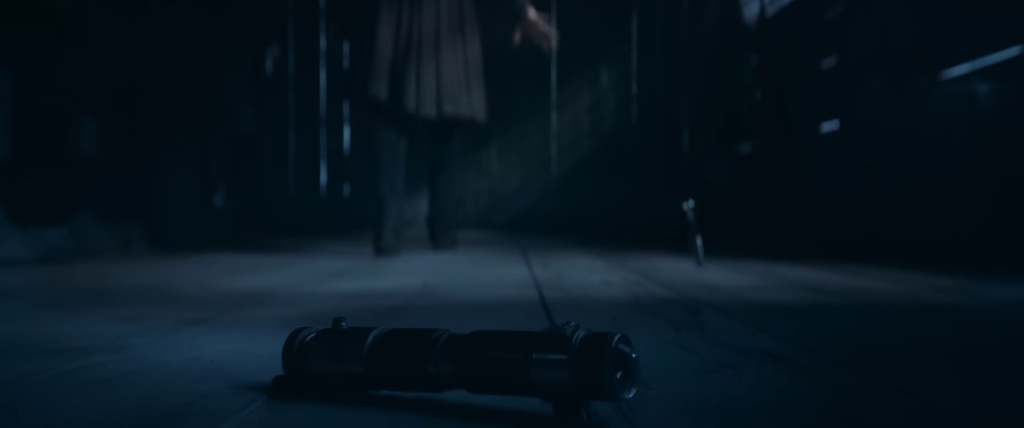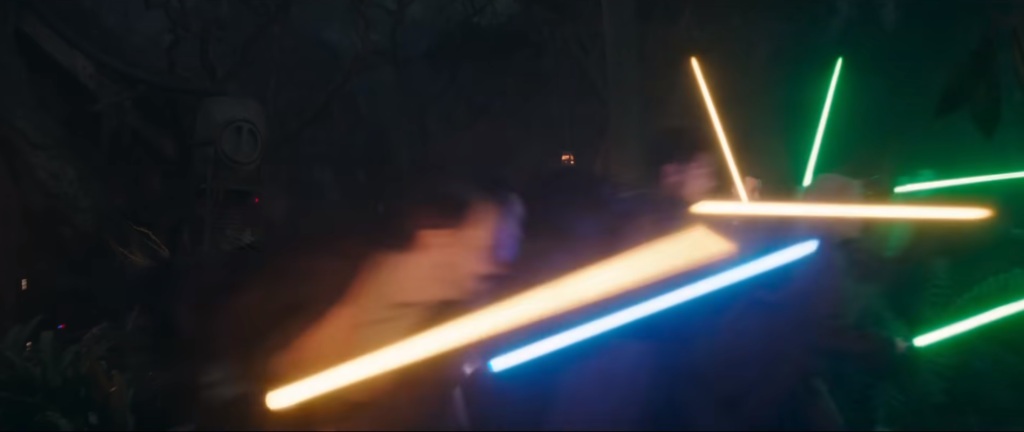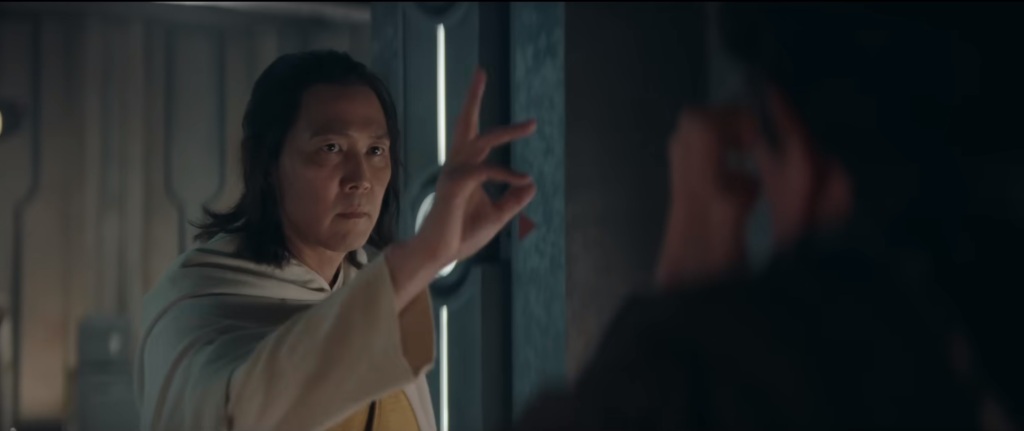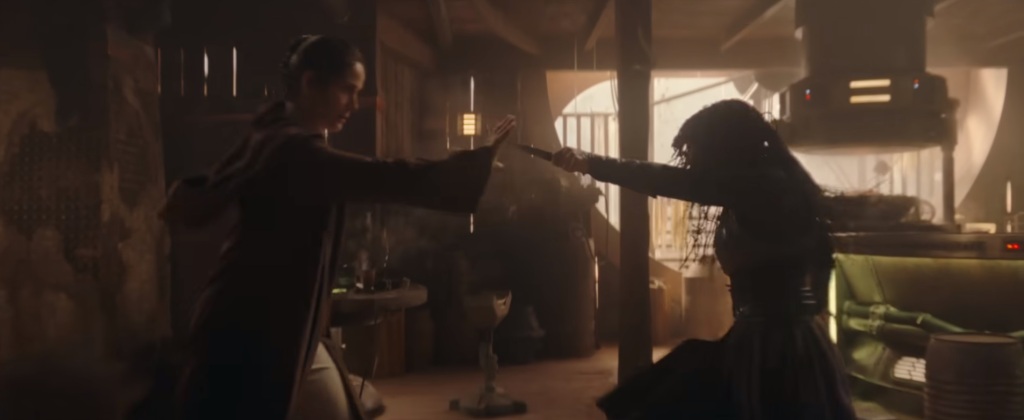Star Wars: The Acolyte (Leslye Headland): ** ½
Does everything Star Wars bring out listless feelings now? Not Galactic Starcruiser. The entire internet mocked the expensive hotel when YouTuber Jenny Nicholson slammed it. Some wonder why her four-hour video is so popular. An answer? It lets people react strongly to Star Wars.
A long time ago…in 1980s America, the original trilogy inspired devotion; at the turn of the millennium, the prequels backlash and defenses; and only seven years ago, The Last Jedi unhinged arguments. But deep in the franchise’s Disney era, it’s irrelevant. Sure, it provokes clickbait rants but not love or hate. It’s too aimless and rushed for that.
Based on the first two episodes, Leslye Headland’s The Acolyte will not change things. The program builds intrigue around shady Jedi knights, but the story is rushed and its examination of guilt shallow. Not that it matters. The Acolyte is just another Star Wars product. Imagine saying that when George Lucas ran this franchise? Back then, a Star Wars work was special, what we all wanted to see and talk about. Now, under Disney, it’s white noise.

This review’s purpose, then, is to jog memories about what pleased and aggravated in the program’s first two hours. The most exciting thing? The premise. Set a century before the prequels, The Acolyte tracks the Jedi, religious warriors we are told protect the galaxy. But they do their jobs poorly—the Republic crumbles in both the prequels and sequels.
Headland’s program digs into this tension. It follows Osha (Amandla Stenberg), a space mechanic who left the Jedi because she couldn’t fit in. She gets roped back into their affairs when Jedi Indara (Carrie Ann Moss) is stabbed, and she becomes a suspect. But it turns out Osha didn’t kill Indara. It was her twin sister Mae (also played by Stenberg), who was thought dead by her own hand after setting the family home ablaze. Clearly, that assumption was wrong. Now, Mae wants revenge on four Jedi she blames for the fire.
Mae’s vengeance may be just. At least that’s how it seems when Indara and Jedi Torbin (Dean-Charles Chapman) welcome death. We will only know after The Acolyte’s inevitable flashback episode. What also seems likely is the Jedi face political risks. A conversation between Osha’s former master Sol (Lee Jung-jae) and head Jedi Venestra (Rebecca Henderson) hints that this situation could cost them status and power.

All this secrecy makes for compelling mystery, teasing how the Jedi appear like schemers. Nothing balances against this perspective, sadly. That’s unsurprising. Since Rian Johnson’s Last Jedi, Disney’s treatment of these guardians is shaped by the notion honorable power cannot exist. A true artist like Lucas did not go for such smug critique. He believed the Jedi could be heroes, but political duties eroded their virtue, and they only realized so when their demise was imminent. This tragedy crested in Revenge of the Sith, a tour-de-force of poignant pain. Nothing in The Acolyte’s simplistic point-of-view will scale such peaks. But it remains absorbing to focus on how slippery and knotty the Jedi are.
It helps that the main performers and characters entertain. Dafne Keen, Charles Barnett, and Manny Jacinto add comic relief as side players who assist or thwart Mae and Osha. Stenberg can’t do much as the backstory-shrouded Mae, but charms as the good-hearted Osha. You believe she’s desperate to help others, even the Jedi, despite all she’s been through.
And yet, these actors don’t hold a candle to Squid Game’s Lee Jung-jae as Master Sol. Sol must calculate the best course of action to protect the Jedi but finds this tough. He is remorseful over how he failed to safeguard Mae as a child and Osha as his student, and this drives him to aid them even though any discovery of the truth on their part threatens the Jedi. Jung-jae communicates this conflict in every scene, glance, and line (which he learned phonetically since English is not his first language). You feel how divided he is. That inner turmoil makes him admirable. He is like Liam Neeson’s Qui-Gon from The Phantom Menace, an accomplished Jedi who feels bending rules and traditions is necessary. And when Jung-jae shows Sol commit to this instinct out of love, The Acolyte moves.

Despite all this, the show works inconsistently. I couldn’t finish Andor, the one beloved Disney Star Wars project, because it felt slow (I know! I KNOW!!). The Acolyte, however, is rushed. Within two episodes, Osha reunites with every Jedi she knows, is cleared of murder, and realizes Mae’s alive. Literally at the same time, Mae kills two enemies, confronts Sol and Osha, and gets foes to admit there’s more to her past. It’s too much too quick—it undercuts mystery, suspense, and drama.
This pace also harms the action. Sometimes, you get invested because of the characters and actors (Carrie Ann-Moss is reliably intense in her cameo), but each duel is sloppy. The random cuts, fight moves, and camera positions seem designed to trick you into thinking you’re seeing something cool when you’re not.
However, The Acolyte most trips up when it explores guilt. The show is filled with regretful characters. But the sense they’re reckoning with trauma, mistakes, and heartbreak is elusive. Having to jam everything in two hours, the program cannot devote time to people’s agony over history. The only parts of Osha’s character that don’t work are those that touch on her unfulfilled Jedi training and possible self-directed rage for moving on from Mae. Both are too underdeveloped to land. Any culpability on Mae’s mind, meanwhile, never comes through because she’s a murder device. Worse, the Jedi, other than Sol, don’t get enough scenes to display profound insight or terror about their pasts.

Perhaps those behind Disney Star Wars can’t evoke guilt because they don’t feel it? Guilt is a brutal emotion that rattles your bones and stabs your heart. It can hold you back from getting over who you were, but it can also help you change into someone who no longer sabotages your noble desires. I’m unsure anyone who runs Disney Star Wars has experienced it. How else to explain why the company churns out mediocre content? If the suits felt shame, wouldn’t they avoid releasing half-baked work? Wouldn’t they stop rushing schedules, stories, and productions?
Who knows? Maybe someday, regret saves this franchise. But The Acolyte shows that’s not today. This unspectacular program isn’t revealing because it demonstrates Disney Star Wars has no clothes on. We diehards have known that for years. Instead, it illuminates the company has no decency to put clothes on after embarrassing itself. At this point, we should feel guilty that we hoped for better.

